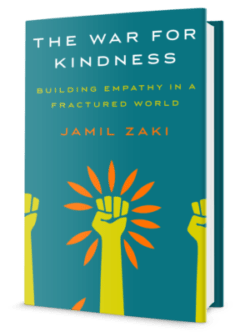Advertisement
We've Become Less Empathetic Over Time. Here Are Some Ways To Improve

For a long time, scientists thought our empathy was just something we're born with - like hair or eye color. As it turns out, that's not the case at all. Professor Jamil Zaki studies empathy as part of Stanford's Social Neuroscience Lab. He says our brains and empathy levels change all of the time - and those changes are concurrent with our experiences.
"That crucially means that the choices that we make and habits that we cultivate can change our empathy on purpose," said Zaki.
Zaki spoke to Kind World about his book "The War For Kindness: Building Empathy In A Fractured World."
If you want to work out your 'empathy muscle', check out Zaki's list of Kindness Challenges for practical ways to exercise empathy.
Listen to Jamil Zaki's interview starting at 10:35. These interview highlights have been condensed for clarity.
On the decline of empathy:
Zaki: According to large-scale surveys, the average American in 2009 was less empathic than 75% of Americans just 30 years earlier.
As to why, that's a little bit trickier. Just because two things happen at the same time, doesn't mean that one caused the other. That said, there are few things that have occurred at the same time as empathy has been eroding: we've become more divided than ever, politically and ideologically. We are more isolated than ever, more likely to live alone and in cities..and interact in thinned out and anonymous ways, like online. We're more stressed than we ever have been before, especially younger people. And all of these forces could be diminishing our capacity or at least our willingness to step out and empathize with others.
On connection:
Zaki: Personal connection with people who are different from us is so powerful because when you hear their actual perspective, no person can be reduced to a stereotype. People are simply too complicated for that. There are cues, seeing someone's face, hearing their voice. That brings up our human capacity for empathy. Somebody who's different from you, sitting across from you, telling you their story and listening to yours is one of the most powerful antidotes for hatred and disconnection that I've ever seen.
We can empathize with people who are thousands of miles away. We can empathize with future generations who don't exist yet. We can empathize with fictional characters who will never exist. That is through the power that we have to extract ourselves from our own version of the world and enter other versions of the world.
On ways to increase empathy:
Zaki: One of my favorite examples is from a friend, who says that when someone cuts them off in traffic, instead of flipping them 'the bird,' they say, 'wow, that person must be having a harder day than me.' These little choices to try and see things from other people's perspective can be really powerful.
I think that by focusing on the capacity we have for kindness and what that kindness can do for us, maybe we can move the needle a little bit on what people want and what people realize is possible.
Guest
Jamil Zaki is the director of the Stanford Social Neuroscience Laboratory. He tweets at @zakijam.

